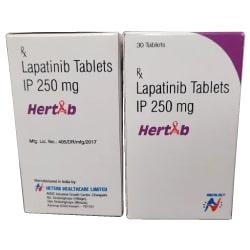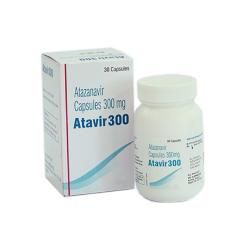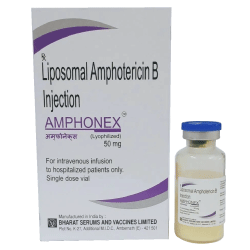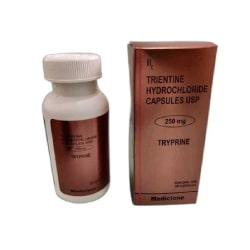Description
Lapatinib tablet is a kinase inhibitor, indicated for the treatment of:
-
In combination with capecitabine for the treatment of patients with advanced or metastatic breast cancer that is HER2 positive (tumors that produce a lot of protein named human epidermal growth factor receptor-2), and who have already had certain other treatment of breast cancer.
-
In combination with the letrozole for treating postmenopausal women with the hormone receptor positive, HER2 positive metastatic breast cancer for whom hormonal therapy is recommended or indicated. For treating metastatic breast cancer, lapatinib together with the aromatase inhibitor has not been compared to the trastuzumab-containing chemotherapy regimen.
Dosage and Side Effects
-
The recommended dosage of Lapatinib for advanced or metastatic breast cancer is 1,250 mg (5 tablets) given orally once daily on Days 1-21 continuously in combination with capecitabine 2,000 mg/m2/day (administered orally in 2 doses approximately 12 hours apart) on Days 1-14 in a repeating 21 day cycle.
-
The recommended dose of Lapatinib for hormone receptor positive, HER2 positive metastatic breast cancer is 1500 mg (6 tablets) given orally once daily continuously in combination with letrozole. When Lapatinib is coadministered with letrozole, the recommended dose of letrozole is 2.5 mg once daily.
-
Lapatinib should be taken at least one hour before or one hour after a meal. However, capecitabine should be taken with food or within 30 minutes after food.
-
Lapatinib should be taken once daily. Do not divide daily doses of Lapatinib.
-
Modify dose for cardiac and other toxicities, severe hepatic impairment, and CYP3A4 drug interactions.
The most common side effect of Lapatinib during treatment with Lapatinib plus capecitabine were diarrhea, palmar-plantar erythrodysesthesia, nausea, rash, vomiting, and fatigue. The most common side effects during treatment with Lapatinib plus letrozole were diarrhea, rash, nausea, and fatigue.
FAQ's
When this drug approved for the breast cancer treatment?
The U.S. FDA approved lapatinib on March 2017, in combination therapy for the breast cancer patients who already using capecitabine (Xeloda).
What kind of drug Tykerb is?
Lapatinib(Tykerb) is a protein kinase inhibitor which is effective in order to decrease tumor-causing breast cancer stem cells.
How to take Lapatinib?
The medicine Lapatinib is taken orally at about the same time each day, at least one hour before or one hour after a meal. The tablets are swallowed with water, do not chew or break the tablets.
What are the ingredients in the medicine Lapatinib?
The active ingredient is Lapatinib, and the inactive ingredients are magnesium stearate, microcrystalline cellulose, povidone, sodium starch glycolate.






